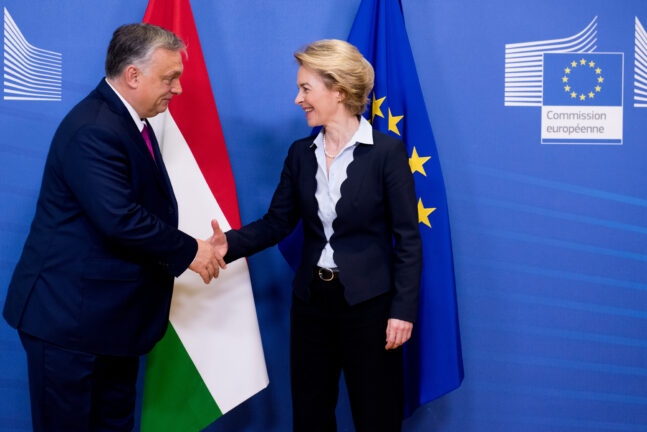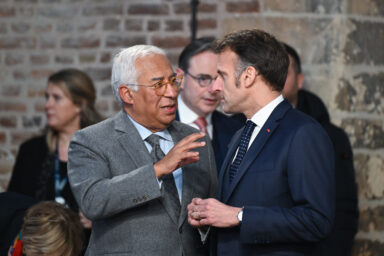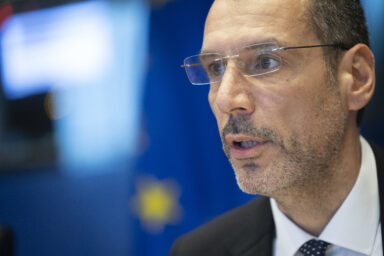The European Commission is planning to radically expand its use of financial leverage to defend democratic values across the EU. In the proposed 2028–2034 Multiannual Financial Framework (MFF), nearly €865bn in spending, almost half of the near €2tn total budget, could be tied directly to rule-of-law conditions, including cohesion and agricultural funds that were long seen as untouchable.
The EU is no longer willing to bankroll governments it accuses of dismantling democratic institutions. “The rule of law must be respected unconditionally,” Commission President Ursula von der Leyen says, promising “very strong safeguards, clear conditionality, and appropriate incentives.”
Power tools
The proposed reforms build on existing tools, such as the Rule of Law Conditionality Regulation and the Recovery and Resilience Facility (RRF), which makes EU funding linked to broad governance standards. The conditionality mechanism, which came into force in 2021, was first triggered in 2022 against Hungary over concerns about public procurement, weak prosecutorial oversight, and systemic corruption under Viktor Orbán’s government.
Within the new proposal, EU funding would also be connected to annual rule-of-law reports, judicial independence, media pluralism, gender equality, and compliance with the EU Charter of Fundamental Rights. And it could also widen its scope. Programs under the National and Regional Partnership Plans (NRPs), now with a €783bn budget the largest spending item in the MFF, will be subject to these new conditions. Until now, cohesion and agricultural payments have largely escaped such scrutiny.
Redirection
The Commission’s proposal also includes a shift toward smart conditionality: instead of merely freezing funds, it could redirect money to final beneficiaries like civil society groups, universities, or municipalities, thus bypassing central governments breaching the rule-of-law. “No EU money for autocrats, but continued support for civil society,” says chair Valérie Hayer (Renew/FRA) , calling the measure a “crucial step in defending both EU values and taxpayers’ money.”
It is a crucial step in defending both EU values and taxpayers’ money. – MEP Valérie Hayer (Renew/FRA)
The EPP, S&D, Renew, and Greens/EFA groups issued a joint statement backing the expanded conditionality mechanism, insisting that “the rule of law should remain an essential prerequisite to access EU funds.” MEP Siegfried Mureșan (EPP/ROM), the Parliament’s co-rapporteur on the MFF, echoed this stance: “If you want access to EU funds, you must respect European values.” He did, however, caution against unintended consequences. He warned that linking cohesion funding too broadly to rule-of-law reforms could undermine the EU’s core principle of solidarity and deepen divisions between Eastern and Western member states. According to the MEP, “vague or poorly targeted conditionality could end up punishing the wrong people.”
Hungary in the hot seat
Few countries are more exposed under the proposed framework than Hungary. Already under Article 7 proceedings and the EU’s Rule of Law Procedure, Hungary has seen €18bn in funds suspended, with little indication of reforms. Now, with most remaining funding, primarily cohesion and agricultural subsidies, soon to be absorbed into the NRP structure, Mr Orbán’s government risks being cut off entirely unless it changes course.
Hungarian officials are pushing back. The minister for European Union Affairs of Hungary, Bóka János, rejected the MFF proposal as “unacceptable,” claiming the real winners are “Ukraine and the European Commission.” The government has characterised the conditionality measures as “political revenge”. MEP Csaba Dömötör (Patriots/HUN) slammed the proposal as “political blackmail. “Withholding money only serves leftist, liberal governments”, he told Euronews.
You might be interested
Investors take note
Yet Hungary’s defiance comes at a steep cost. Sovereign debt levels have surged to 75.5 per cent of the GDP. Rating agencies have issued negative outlooks, citing the risk of permanently losing EU funding. Spreads on Hungarian bonds have widened, and foreign direct investment is under pressure. The IMF has warned of debt rising above 80 per cent of the GDP by 2026 if consolidation measures aren’t taken.
Beyond political sparring, the implications are financial and immediate. Hungary’s fiscal deterioration is triggering investor worries, and the specter of full suspension of EU funds could have regional consequences. Countries flirting with authoritarianism may find themselves cut off, not just from Brussels, but from global capital markets as the EU is seemingly successfully using fiscal leverage to enforce political compliance.
Market analysts are already advising clients to avoid Hungarian debt unless governance improves.
A broader regional reckoning
Slovakia, Romania, and Poland are also watching closely. Romania’s foreign minister Teodor Meleșcanu previously dismissed the plans as a “gross violation” of EU principals.
Similarly, Slovakia’s ruling party claims the EU is abusing its powers to interfere with national judicial reforms. “Such an approach is highly dangerous,” Branislav Ondruš (NA/SK). His compatriot Ľubica Kravašová (Renew) argues the opposite: conditionality is vital to tackling corruption and upholding basic standards across the bloc, she claims.
Commission wants to make funding conditional on fulfilling crazy ideas. It’s madness. – MEP Patryk Jaki (ECR/POL)
Polish MEP Patryk Jaki (ECR) denounced the proposal as an attempt by the European Commission to impose a “woke agenda” on EU member states. “You [the Commission] have taken the best continent and ruined it,” he said. “Now you want to make funding conditional on fulfilling crazy ideas. It’s madness.”
His compatriot Arkadiusz Mularczyk (ECR) similarly criticised what he called the “politicisation of EU financing mechanisms.” He accused the Commission of acting with political bias when it unfroze Poland’s Recovery and Resilience Facility (RRF) funds following the 2023 election of Donald Tusk as prime minister. According to Mularczyk, the release of funds was not due to Poland meeting the required rule-of-law milestones, but rather ‘because the Commission favours Tusk politically’. The EU had previously withheld the funds over persistent concerns about judicial independence and democratic backsliding under the previous government.
Negotiations over the MFF will likely continue well into 2027. Given that every member state, including those strongly opposed to the conditionality mechanism, holds a veto, the Commission will need to be creative in finding leverage and building consensus to ensure the proposal ultimately passes.











